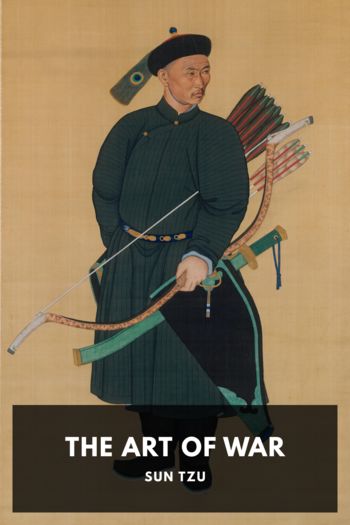The Art of War, Sun Tzu [best english books to read for beginners TXT] 📗

- Author: Sun Tzu
Book online «The Art of War, Sun Tzu [best english books to read for beginners TXT] 📗». Author Sun Tzu
A useful fact to bear in mind when, for instance, as Chʽen Hao says, the enemy has secretly abandoned his camp. ↩
Owing to false alarms; or, as Tu Mu explains it: 恐懼不安故夜呯以自壯也 “Fear makes men restless; so they fall to shouting at night in order to keep up their courage.” The Tʽung Tien inserts 喧 before 呯. ↩
The Tʽung Tien and Yü Lan omit 旌. ↩
And therefore, as Capt. Calthrop says, slow to obey. Tu Yu understands the sentence differently: “If all the officers of an army are angry with their general, it means that they are broken with fatigue” (owing to the exertions which he has demanded from them). ↩
粟馬肉食 is expanded by Mei Yao-chʽên (following Tu Mu) into 給糧以秣乎馬殺畜以饗乎士, which is the sense I have given above. In the ordinary course of things, the men would be fed on grain and the horses chiefly on grass. ↩
The Tʽung Tien reads 缶, which is much the same as 缻, and the Yü Lan 箠, which is manifestly wrong. ↩
For 返, the Tʽung Tien and Yü Lan both read 及. ↩
For 窮宼, see note 398 on VII. I may quote here the illustrative passage from the Hou Han Shu, ch. 71, given in abbreviated form by the Pʽei Wên Yün Fu: “The rebel 王國 Wang Kuo of 梁 Liang was besieging the town of 陳倉 Chʽên-tsʽang, and 皇甫嵩 Huang-fu Sung, who was in supreme command, and 董卓 Tung Cho were sent out against him. The latter pressed for hasty measures, but Sung turned a deaf ear to his counsel. At last the rebels were utterly worn out, and began to throw down their weapons of their own accord. Sung was now for advancing to the attack, but Cho said: ‘It is a principle of war not to pursue desperate men and not to press a retreating host.’ Sung answered: ‘That does not apply here. What I am about to attack is a jaded army, not a retreating host; with disciplined troops I am falling on a disorganised multitude, not a band of desperate men.’ Thereupon he advanced to the attack unsupported by his colleague, and routed the enemy, Wang Kuo being slain.” The inferior reading of the Tʽu Shu for this paragraph is as follows: 殺馬肉食者軍無糧也縣缻不返其舍者窮宼也. The first clause strikes me as rather shallow for Sun Tzǔ, and it is hard to make anything of 縣缻 in the second without the negative. Capt. Calthrop, nothing daunted, set down in his first edition: “When they cast away their cooking-pots.” He now has: “When the cooking-pots are hung up on the wall.” ↩
諄諄 is well explained by Tu Mu as 乏氣聲促 “speaking with bated breath.” ↩
The Shuo Wên rather strangely defines 翕 by the word 起, but the Êrh Ya says 合 “to join” or “contract,” which is undoubtedly its primary meaning. Chang Yü is right, then, in explaining it here by the word 聚. The other commentators are very much at sea: Tsʽao Kung says 失志貌, Tu Yu 不眞, Tu Mu 顚倒失次貌, Chia Lin 不安貌, Mei Yao-chʽên 曠職事, Wang Hsi 患其上. ↩
入入 is said to be the same as 如如. ↩
失衆 is equivalent to 失其衆心, the subject of course being “the general,” understood. In the original text, which seems to be followed by several commentators, the whole passage stands thus: 諄諄翕翕徐與人言者失衆也. Here it would be the general who is talking to his men, not the men amongst themselves. For 翕, which is the chief stumbling-block in the way of this reading, the Tʽu Shu gives the very plausible emendation





Comments (0)